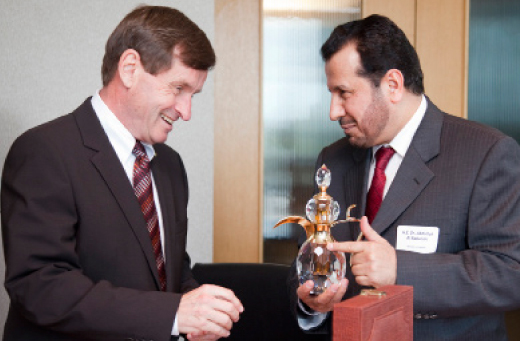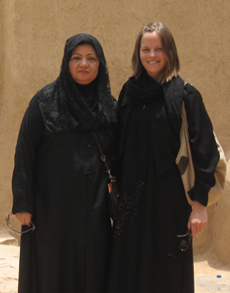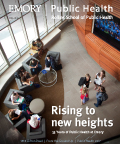Saudi health leaders partner with Emory

RSPH Dean James Curran (left) accepts a gift from Saudi Minister of Health Abdullah Al Rabeeah after signing a partnership agreement.
This summer, epidemiology major Jessie Gleason became the first Rollins student to benefit from a new partnership with Saudi Arabia.
The five-year agreement between Emory and the Saudi Ministry of Health (MOH) opens the door to collaborative training and research for public health students and professionals. Emory President James Wagner, RSPH Dean James Curran, and Saudi Minister of Health Abdullah Al Rabeeah signed the agreement last spring.
Gleason spent six weeks gathering data for her study on tuberculosis trends in Saudi Arabia by geographic region, age, nationality, and gender from 2005 to 2009. The study will form the basis of her master’s thesis.
“I’m looking at each province’s trends in notified TB cases, and more specifically by nationality,” says Gleason. “By investigating these trends, we plan to better target high-risk groups and areas and recommend ways to improve case detection and programs to lower incidence rates.”
|
While in Saudi Arabia, Jessie Gleason (right) worked with Nalia Abduljadayel, director of the nation’s TB program, to analyze TB trends by geographic region, nationality, and gender. |
While in Saudi Arabia, Gleason worked with several health experts, including Ziad Memish, assistant deputy minister of health for preventive medicine. Memish is among the MOH officials who approached the RSPH about training public health students from his country. The first Saudi students will enroll at Rollins next fall, supported by MOH scholarships. Scott McNabb, an adjunct professor in the Hubert Department of Global Health, and Victoria Phillips, associate professor of health policy, traveled to Saudi Arabia this past summer, in part to support Gleason. McNabb will return there this fall to advise prospective students. Recently retired from the CDC, McNabb worked three years with Saudi public health officials to develop an integrated disease surveillance system. Last year, he collaborated with the Saudi MOH to better prepare for a possible H1N1 outbreak during the Haij, the annual pilgrimage of 2 million Muslims to Mecca. When Memish expressed a need to train public health students, McNabb referred him to the RSPH.
“Our partnership with Rollins is going to be an interesting endeavor,” says Memish, an adjunct professor. “By involving experts and students from both countries, we can learn from each other and improve the quality of services we provide through the Ministry of Health.”—Pam Auchmutey



